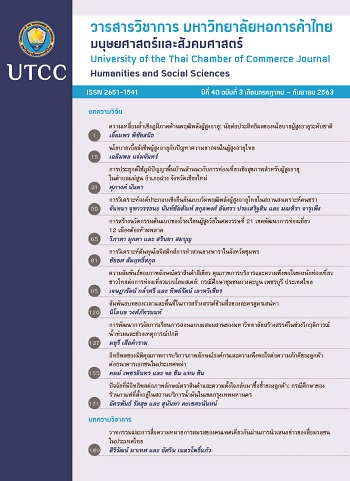Application of Lanna Local Wisdom to Health Tourism for the Elderly in Mae Soon Sub District, Community Fang District, Chiang Mai Province
Main Article Content
Abstract
The objectives of this research were to investigate and manage Lanna local wisdom for health tourism promotion of the elderly and apply Lanna local wisdom to health tourism for the elderly. This qualitative research utilized in-depth interviews, participant observation, and a community forum to examine secondary data. The sample group was members of the elderly club, local philosophers, community members, volunteers from the sub district administration organization, public health officers, community developers, village health volunteers, officers from the health-promoting hospital, and officers from the National Health Security Office. The purposive sampling method was applied to obtain 60 samples. The research results showed that Mae Soon sub district community, Fang District, Chiang Mai retrieved four aspects of local wisdom, which were hand and foot bathing in herbal water, herbs for treatment, folk games and orthotics. The management of Lanna local wisdom to promote health tourism for the elderly included knowledge construction, knowledge transfer, and the application of knowledge. Lanna local wisdom was applied to health tourism for the elderly in two dimensions including the area of health promotion and treatment
Article Details
ลิขสิทธิ์ของบทความ
ผลงานที่ได้รับการตีพิมพ์ถือเป็นลิขสิทธิ์ของมหาวิทยาลัยหอการค้าไทย ห้ามมิให้นำเนื้อหา ทัศนะ หรือข้อคิดเห็นใด ๆ ของผลงานไปทำซ้ำ ดัดแปลง หรือเผยแพร่ ไม่ว่าทั้งหมดหรือบางส่วนโดยไม่ได้รับอนุญาตเป็นลายลักษณ์อักษรจากมหาวิทยาลัยหอการค้าไทยก่อน
References
กรมกิจการผู้สูงอายุ. (2562). เอกสารสถิติผู้สูงอายุของประเทศไทย 77 ณ วันที่ 31 ธันวาคม 2562. สืบค้นเมื่อ 13 มีนาคม 2563, จาก http://www.dop.go.th/ download/knowledge/th1580099938-275_1.pdf.
จักรพงษ์ คำบุญเรือง. (2561, 14 สิงหาคม). “หมอเมือง”ภูมิปัญญาพื้นบ้านล้านนา. Chiang Mai News. สืบค้นจาก https://www.chiangmainews.co.th/page/archives/779027/
ไททัศน์ มาลา. (2562). การมีส่วนร่วมในการจัดการความรู้ภูมิปัญญาผู้สูงอายุเพื่อการเรียนรู้ตลอดชีวิตของชุมชนในเขต เทศบาลเมืองสระแก้ว จังหวัดสระแก้ว. วารสารวิจัยและพัฒนาวไลยอลงกรณ์ ในพระบรมราชูปถัมภ์ สาขามนุษยศาสตร์และสังคมศาสตร์, 14(1), 206-215.
ธนันรักษ์ วัชราธร, วรวุฒิ เพ็งพันธ์, และสุวิชัย โกศัยยะวัฒน์. (2560). แนวทางการส่งเสริมการท่องเที่ยวเชิงสุขภาพสำหรับผู้สูงอายุในเขต อำเภอเมือง จังหวัดชลบุรี. วารสารการศึกษา และการพัฒนาสังคม, 13(1), 260-275.
ปราณิดา ศยามานนท์, ชุติมา ตันตะราวงศา, กวีพล พันธุ์เพ็ง, พริมา อัครยุทธ, และลภัส อัครพันธุ์.(2561). ผ่ากลยุทธ์ธุรกิจพิชิตวัยเกษียณ. สืบค้นจาก https://www.scbeic.com/th/detail/file/ product/1375/e4hwh2n6ry/EIC_insight_Thai_aging_Q2_2015.pdf.
ปริญญา นาคปฐม, และระชานนท์ ทวีผล. (2561). การพัฒนาคุณภาพงานบริการทางการท่องเที่ยวสำหรับกลุ่มนักท่องเที่ยวผู้สูงอายุ. วารสารบัณฑิตศึกษา มหาวิทยาลัยราชภัฏวไลยอลงกรณ์ ในพระบรมราชูปถัมภ์, 12(1), 255-269.
รัชนีกร ปัญญา. (2556). การพัฒนาการบริหารจัดการต้นทุนการท่องเที่ยวเชิงสุขภาพของท้องถิ่นจังหวัดเชียงใหม่: รายงานการวิจัย. เชียงใหม่: มหาวิทยาลัยราชภัฏเชียงใหม่.
ลักษณา เกยุราพันธุ์. (2561). รูปแบบการจัดการความรู้ภูมิปัญญาและวัฒนธรรมท้องถิ่น กรณีศึกษา: อำเภอปากพลีจังหวัดนครนายก. วารสารวิจัยและพัฒนาวไลยอลงกรณ์ ในพระบรมราชูปถัมภ์ สาขามนุษยศาสตร์และสังคมศาสตร์, 13(2), 75-85.
วณิฎา ศิริวรสกุล, และวัชรินทร์ อินทพรหม. (2559). การจัดการความรู้ภูมิปัญญาท้องถิ่นสู่การท่องเที่ยวเชิงนิเวศน์วัฒนธรรม กรณีศึกษาตำบลเกาะเกิด อำเภอบางปะอิน จังหวัดพระนครศรีอยุธยา. วารสารวิจัยราชภัฏพระนคร สาขามนุษยศาสตร์และสังคมศาสตร์, 11(1), 42-49.
วัชรากรณ์ชีวโศภิษฐ. (2562). สังคมผู้สูงอายุ: ปัจจัยการตลาดที่เปลี่ยนไป. วารสารมหาจุฬานาครทรรศน์, 6(1), 38-54.
วิราพรรณ วิโรจน์รัตน์, ขวัญใจ อำนาจสัตย์ซื่อ, ศิริพันธ์ สาสัตย์, พรทิพย์ มาลาธรรม, และจิณณ์สิธา ณรงค์ศักดิ์. (2557). การพัฒนาระบบบริการสุขภาพสำหรับผู้สูงอายุที่ต้องพึ่งพาผู้อื่น. วารสาร สภาการพยาบาล, 29(3), 104-115.
วิลาสินี ยนต์วิกัย. (2562). แนวทางการพัฒนาธุรกิจเพื่อรองรับพฤติกรรมการท่องเที่ยวของผู้สูงอายุในประเทศไทย. วารสารวิทยาลัยดุสิตธานี, 13(2), 428-438.
วุฒิชาติ สุนทรสมัย, และปิยะพร ธรรมชาติ. (2559). รูปแบบการท่องเที่ยวชุมชนเชิงสุขภาพของจังหวัดปราจีนบุรีเพื่อการพัฒนาเครือข่ายวิสาหกิจชุมชนอย่างยั่งยืน. วารสารสมาคมนักวิจัย,21(3), 167-181.
ศุภางค์ นันตา, อุบลวรรณ สุวรรณภูสิทธิ์, และจณัญญา วงศ์เสนาจงศิริ. (2561). การใช้สมุนไพรพื้นบ้านกับการท่องเที่ยวเชิงส่งเสริมสุขภาพ จังหวัดสุรินทร์. ใน รายงานสืบเนื่องงานประชุมวิชาการระดับชาติและนานาชาติราชภัฎวิจัยครั้งที่ 5 “สหวิทยาการกับการสร้างสรรค์นวัตกรรมเพื่อขับเคลื่อนงานวิจัยฐานรากสู่สากลในศตวรรษที่ 21” (น. 922-927). เพชรบุรี: มหาวิทยาลัยราชภัฏเพชรบุรี.
ศูนย์วิจัยกสิกรไทย. (2562). 2565 ไทยเข้าสู่สังคมผู้สูงอายุสมบูรณ์ โอกาสทางธุรกิจสำหรับสินค้าและบริการเพื่อผู้สูงอายุ. สืบค้นเมื่อ 13 มีนาคม 2563, จาก https://kasikornresearch.com/th/analysis/k-social-media/Pages/FB-older-22-11-19.aspx.
สามารถ ใจเตี้ย, และณรงค์ ณ เชียงใหม่. (2560). ปัจจัยทำนายการใช้ประโยชน์พืชสมุนไพรพื้นบ้าน ของประชาชนลุ่มน้ำลี้ จังหวัดลำพูน. วารสารราชพฤกษ์, 15(3), 70-78.
สำนักงานจังหวัดเชียงใหม่. (2561). แผนพัฒนาจังหวัดเชียงใหม่ พ.ศ. 2561- 2564 (ฉบับทบทวน รอบปี พ.ศ. 2562). เชียงใหม่: ผู้แต่ง.
สุรพงษ์ มาลี. (2561). รู้จักสังคมสูงอายุ และสถานการณ์ผู้สูงอายุ (ในประเทศไทย). วารสารข้าราชการ, 60(4), 5-8.
สุรีย์ ธรรมิกบวร, และชุภาศิริ อภินันท์เดชา. (2559). การพัฒนารูปแบบการท่องเที่ยวเพื่อการส่งเสริมสุขภาพผู้สูงอายุ ตามวิถีวัฒนธรรมสุขภาพลุ่มแม่น้ำโขง (หมู่บ้านซะซอม) จังหวัดอุบลราชธานี. วารสารพยาบาลศาสตร์วารสารพยาบาลศาสตร์ จุฬาลงกรณ์มหาวิทยาลัย, 28(1), 25-40.
องค์การบริหารส่วนตำบลตำบลแม่สูน. (2561). แผนพัฒนาท้องถิ่นสี่ปี (พ.ศ.2561- 2564). เชียงใหม่:งานนโยบายและแผนสำนักปลัดองค์การบริหารส่วนตำบลตำบลแม่สูน.
อุทุมพร ศรีเขื่อนแก้ว, อธิวัฒน์ เจี่ยวิวรรธน์กุล, และสาวิตรี ทยานศิลป์. (2561). ความสัมพันธ์ระหว่างความสุข ความรอบรู้ด้านสุขภาพและคุณภาพชีวิตของผู้สูงอายุ: กรณีศึกษาผู้สูงอายุในโรงเรียนผู้สูงอายุ ตำบลเวียง อำเภอฝาง จังหวัดเชียงใหม่. วารสาร MFU-CONNEXION, 7(2), 76-95.
เอกชัย พุมดวง. (2559). กลยุทธ์การจัดการความรู้ภูมิปัญญาท้องถิ่นเพื่อการเรียนรู้ตลอดชีวิตของชุมชนตำบลโคกโคเฒ่า อำเภอเมือง จังหวัดสุพรรณบุรี. ใน การประชุมทางวิชาการของ มหาวิทยาลัยเกษตรศาสตร์ ครั้งที่ 53 (น. 993-1000). กรุงเทพฯ: มหาวิทยาลัยเกษตรศาสตร์.
Asrar-ul-Haq, M., & Anwar, S. (2016). A systematic review of knowledge management and knowledge sharing: trends, issues, and challenges. Cogent Business and Management, 3(1), 1-17.
Balderas, A. (2019). Towards a deeper understanding of senior tourists: challenges and opportunities of an emerging market segment. Journal of Tourism and Heritage Research, 2(2), 262-277.
Dejvit, N., & Thipatu, K. (2016). Process and strategy of transferring local wisdom:Case study at TambonFaham, Muang, Chiang Mai. Chiang Mai: Chiang Mai Rajabhat University, Research and Development Institute.
Heber, C. D., Durvasula, A., Hancock, A. M., & Lohmueller, K. E. (2018). Gene expression drives the evolution of dominance. Nat Commun Journal, 9(1), 1-11.
Ile, F.L., & Tigu, G. (2017). Medical tourism market trends-an exploratory research. Proceedings of the International Conference on Business Excellence 11, 1112-1121.doi: 10.1515/picbe-2017-0114
Illario, M., Bousquet, J., Farrell, J., & Sachinopoulou, A. (2019). The reference site collaborative network of the European innovation partnership on active and healthy ageing. Journal of the Medical School of the University of Salerno, 19(11), 66-81.
Kravchenko, A. N., Toosi, E. R., Guber, A. K., Ostrom, N. E., Yu, J., Azeem, K., … Robertson, G. P. (2017). Hotspots of soil N2O emission enhanced through water absorption by plant residue. Journal of Nature Geoscience, 10(7), 496-500.
Meltem, U., & Erdogan, E. (2016). An overview of health tourism within the context of Turkey. Journal of Hospitality and Tourism,14(1), 18-26.
Patterson, I., & Balderas, A. (2018). Continuing and emerging trends of senior tourism: A review of the literature. Journal of Population Ageing, 6(3), 4-18.
Saeide, A., Zahra, M., Azra, I., Somayah, B., & Mahdieh, M. (2016). Qualitative examination of health tourism and its challenges. International Journal of Travel Medicine and Glabal Health, 4(3), 88-91.
Sompong, N., Rampai, N., & Kheerajitt, C. (2015). Knowledge management of local wisdom model for tourism along the route of lower central provinces of Thailand. Turkish Online Journal of Educational Technology, 2015(August), 271-276.
Swacha, J. (2015). Gamification in knowledge management: motivating for knowledge sharing. Polish Journal of Management Studies, 12(2), 150-160.
Torabipour, A., Qolipour, M., & Gholipour. K. (2016). Medical tourism services quality analysis: A systematic review. International Journal of Medical Review, 3(2), 1-9.
United Nation. (2015). World populations ageing 2015. New York, NY: Author.
Wang, K.Y., Tan, L.P., Cheng, S.L., & Wong, W.P. (2015). Knowledge management performance measurement: Measures, approaches, trends and future directions. Information Development, 31(3), 239-257.
Zhang, L., & Zhang, J. (2018). Impacts of leisure and tourism on the elderly’s quality of life in intimacy: A comparative study in Japan. Sustainability MDPI Journal, 10(12), 1-17.


